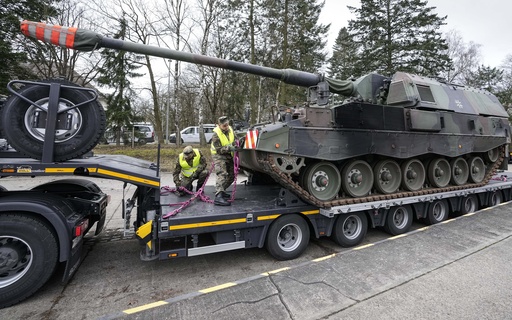BRUSSELS — A report released on Wednesday by auditors revealed that a European Union fund, which aims to facilitate the quick deployment of troops, tanks, and military resources across the bloc during conflicts, is insufficiently sized and poorly managed to be truly effective. The report highlights that red tape at EU internal borders hampers allied military operations, with one member state reportedly requiring a 45-day notification period for authorizing military convoys to transit. As the war in Ukraine continues, enhancing military mobility has become increasingly critical.
NATO Secretary-General Mark Rutte emphasized the urgency of the situation last month, stating that the future security of Europe hinges on the war’s outcome. He warned that if Russian President Vladimir Putin achieves his goals, long-term peace would be jeopardized. “We are safe now. We might not be safe in 5 years,” he cautioned.
The military mobility fund was established as part of an “Action Plan” initiated in 2022, following Russia’s extensive invasion. This fund allocated resources for 95 projects spread across 21 nations aimed at enhancing infrastructure—such as bridges, roads, and railways—for both civilian and military use. However, the fund totals a mere 1.7 billion euros (approximately $1.8 billion), a sum Tony Murphy, president of the European Court of Auditors, deemed insignificant in light of an estimated 300 billion euros ($312 billion) spent by EU member states on defense within the last year.
Murphy criticized the hastily assembled action plan, asserting it was not grounded in rigorous needs assessment. He pointed out that the European Commission proceeded without adequately evaluating requirements in advance. As a result, the budget did not accurately reflect the objectives at hand. He noted, “The fund was just a fraction compared to the overall needs.”
Much of the funding intended to enhance military mobility for the 2022-2026 timeframe was quickly allocated, depleting the fund within the first two years. The auditors proposed the inclusion of EU civilian transport funding to help alleviate transport bottlenecks. While the majority of approved projects are located in countries adjacent to Russia, Belarus, and Ukraine, the southern transport corridor to Ukraine was largely overlooked. Greece received no funding, and Bulgaria’s project was only granted a modest amount.
Murphy expressed concern that the projects were selected in an inconsistent manner without a cohesive strategy. To the auditors’ surprise, some projects were prioritized before assessing the most pressing needs. He also pointed out the confusion surrounding leadership, as there is no designated single point of contact at the EU level for military mobility.
In response to the auditors’ findings, the European Commission defended its approach. In an email to reporters prior to the report’s publication, the commission stated that when presented with the necessity to aid Ukraine, it responded swiftly by expediting funding for projects. The commission also highlighted military mobility as a cornerstone issue for the newly commenced commission, which includes the introduction of its first-ever defense commissioner. It acknowledged the need to tackle the concerns about collaboration and coordination in this area.
The commission recognized the recommendations from the European Court of Auditors as a chance to make essential advancements in improving military mobility within the EU.



